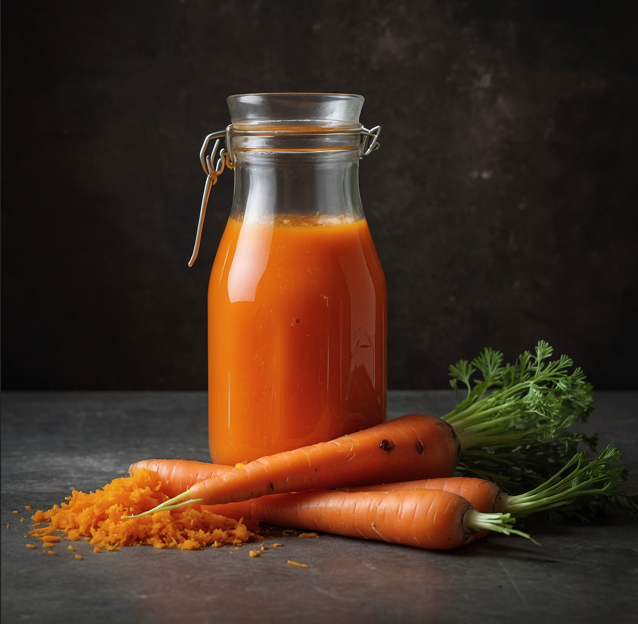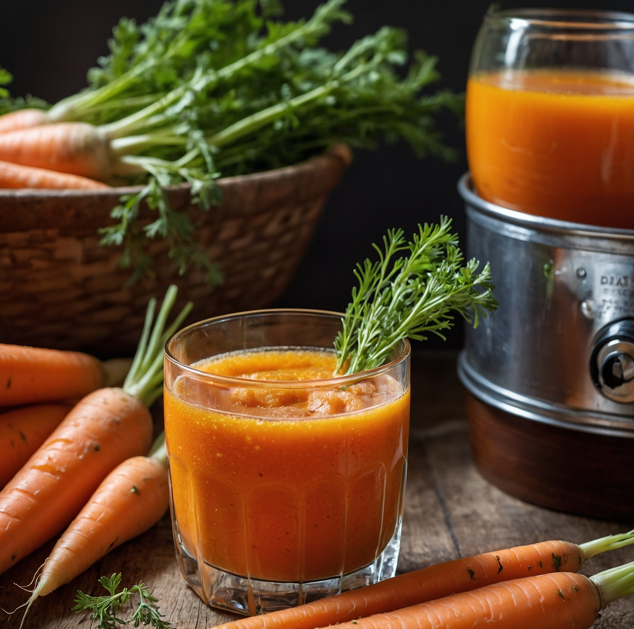Carrot juice is a refreshing and nutrient-rich beverage that’s easy to prepare at home. In this carrot juice recipe, you’ll learn how to make a delicious and health-boosting drink while exploring its incredible benefits. Whether you’re looking to improve your health or simply enjoy a naturally sweet juice, this guide has you covered.
The Rising Popularity of Carrot Juice
The increasing interest in carrot juice can be attributed to the global focus on healthy living and natural remedies. As more people seek to incorporate nutrient-dense options into their diets, carrot juice has emerged as a convenient and versatile choice. Its vibrant orange hue, sweet flavour, and ability to pair seamlessly with other ingredients make it a favourite among juice enthusiasts. Additionally, its reputation as a superfood beverage has grown, bolstered by endorsements from nutritionists and fitness experts alike.
Nutritional Benefits of Carrots
Carrots are renowned for their wealth of nutrients, and their juice offers a concentrated dose of these health-boosting components. Rich in beta-carotene, carrots support healthy vision, skin, and immune function. The body converts beta-carotene into vitamin A, which is essential for maintaining optimal eye health and promoting cell growth.
In addition to vitamin A, carrot juice contains an abundance of other essential vitamins and minerals, such as vitamin K, potassium, and antioxidants. These nutrients contribute to cardiovascular health, support proper blood clotting, and combat oxidative stress in the body. Moreover, its fibre content (when consumed as part of whole carrots) aids digestion, although juicing reduces the fibre content, making it easier to absorb the concentrated nutrients.
Carrot juice is not just a delicious beverage; it is a nutritional powerhouse that offers significant health benefits. Its rising popularity is well-deserved, making it an excellent addition to any diet focused on health and vitality.
Why Drink Carrot Juice?
Carrot juice is not just a delicious and refreshing beverage; it is a powerhouse of essential nutrients that support overall well-being. From improving skin and eye health to boosting the immune system, this vibrant drink offers a multitude of health benefits, making it a valuable addition to any diet.
Health Benefits
Carrot juice is rich in essential vitamins, minerals, and antioxidants that promote overall health. It is an excellent source of beta-carotene, potassium, and vitamin C, which collectively support various bodily functions. Regular consumption of carrot juice can aid in reducing the risk of chronic diseases, improving heart health, and supporting digestive health due to its antioxidant and anti-inflammatory properties.
Moreover, its low calorie yet nutrient-dense profile makes it a perfect choice for those aiming to maintain a healthy weight or looking to manage their energy levels effectively throughout the day.
Skin and Eye Health Improvements
Carrot juice is particularly celebrated for its positive effects on skin and eye health. The beta-carotene found in carrots is converted into vitamin A by the body, which is crucial for maintaining clear and healthy vision. It helps in preventing night blindness and reducing the risk of age-related eye conditions such as macular degeneration.
For the skin, the antioxidants in carrot juice combat free radicals, preventing premature ageing and enhancing the skin’s natural glow. Vitamin C, another key component, supports collagen production, which keeps the skin firm and youthful. Drinking carrot juice regularly can also help in reducing blemishes and promoting a smooth complexion.
Boosting Immunity
Carrot juice acts as a natural immunity booster, thanks to its rich concentration of vitamin C and antioxidants. Vitamin C strengthens the immune system by stimulating the production of white blood cells, which play a crucial role in defending the body against infections. The antioxidants in carrot juice further help in protecting cells from damage caused by harmful free radicals, enhancing the body’s natural defences.
Additionally, carrot juice contains small amounts of other immune-supportive nutrients, such as vitamin B6 and folate, which assist in maintaining a robust immune response.
Incorporating carrot juice into your daily routine is a simple yet effective way to harness its numerous health benefits. Its ability to improve skin and eye health, bolster immunity, and support overall wellness makes it an exceptional choice for anyone seeking a natural and nutritious beverage.
Essential Ingredients for Carrot Juice

Making carrot juice at home is a straightforward process, and the quality of the ingredients plays a vital role in ensuring a fresh, flavourful, and nutrient-rich drink. Here are the essentials you’ll need to prepare this wholesome beverage.
Fresh Carrots
The cornerstone of any carrot juice recipe is, of course, fresh carrots. Opt for carrots that are firm, bright orange, and free of blemishes. Fresh carrots not only enhance the taste of your juice but also ensure that you get the maximum nutritional benefits. Their natural sweetness makes them perfect for juicing, whether used alone or in combination with other ingredients.
Optional Ingredients
To add variety and extra flavour to your carrot juice, you can incorporate a range of optional ingredients:
- Ginger: A small piece of ginger adds a spicy kick and enhances the anti-inflammatory properties of your juice.
- Oranges: Adding oranges introduces a tangy sweetness and boosts the vitamin C content, making your juice even more immune-friendly.
- Apples: A sweet apple, such as a Fuji or Gala, complements the earthiness of carrots and balances the flavour profile.
Feel free to experiment with these ingredients to create a blend that suits your palate.
Choosing Organic Produce
Whenever possible, choose organic produce for your carrot juice. Organic carrots and other ingredients are free from harmful pesticides and chemicals, ensuring that your juice is as pure and healthful as possible. While organic produce may come at a slightly higher price, the health benefits and superior taste make it a worthwhile investment.
Tools You’ll Need
Creating carrot juice at home requires minimal equipment, but having the right tools can make the process more efficient and enjoyable. Here’s what you’ll need:
Juicer or Blender
A juicer is the ideal tool for making carrot juice, as it extracts the juice efficiently and leaves behind the pulp. If you don’t have a juicer, a blender works just as well. When using a blender, you may need to add a small amount of water to help the blending process.
Strainer Options
If you use a blender, a strainer is essential for removing the pulp to achieve a smooth juice consistency. You can choose from several strainer options, such as:
- Fine mesh sieve: Effective for basic straining needs.
- Nut milk bag: Provides a finer strain, resulting in a smoother juice.
- Cheesecloth: A versatile and cost-effective option for straining juice.
Cutting Board and Knife
Before juicing or blending, you’ll need a cutting board and a sharp knife to prepare the carrots and any additional ingredients. Chopping the produce into smaller pieces ensures that they fit into your juicer or blender easily, saving time and effort.
With these ingredients and tools on hand, you’ll be well-equipped to create fresh, delicious carrot juice in the comfort of your home.
How to Select the Best Carrots for Juice
Selecting the right carrots is essential for creating flavourful and nutrient-rich juice. Fresh, high-quality carrots not only improve the taste but also maximise the health benefits of your drink.
Identifying Fresh and Sweet Carrots
The key to making delicious carrot juice is choosing fresh, sweet carrots. Look for carrots that:
- Have a bright orange colour: Vibrant carrots are often more nutrient-dense and flavourful.
- Are firm to the touch: Avoid carrots that feel soft or limp, as they may have lost their freshness.
- Have smooth skin: Carrots with a smooth, unblemished surface are ideal for juicing.
- Have fresh, green tops (if still attached): Healthy greens indicate that the carrots are fresh. However, the tops should be removed before juicing to prevent bitterness.
For the sweetest juice, opt for young carrots or specific varieties like Nantes or Chantenay, known for their naturally sweet flavour.
Importance of Storage and Handling
Proper storage and handling ensure your carrots retain their freshness and nutrients. Follow these tips:
- Refrigerate immediately: Store carrots in the refrigerator, ideally in the crisper drawer, to maintain their crunch and prevent wilting.
- Keep them dry: Moisture can lead to spoilage, so store carrots in a perforated bag or wrap them in a paper towel.
- Trim the greens: If your carrots come with tops, remove them before storing, as they can draw moisture from the roots and cause the carrots to dry out.
By selecting and handling carrots with care, you’ll ensure your juice is as fresh and delicious as possible.
Step-by-Step Guide to Making Carrot Juice
Making carrot juice at home is simple and rewarding. Follow this step-by-step guide to prepare a refreshing glass of juice using either a juicer or a blender.
Preparing Carrots
- Wash thoroughly: Rinse the carrots under cold water to remove dirt and debris. Use a vegetable brush if necessary.
- Peel if desired: While the skin contains nutrients, you may peel the carrots for a smoother texture and milder flavour.
- Chop into pieces: Cut the carrots into smaller chunks, especially if you’re using a blender, to make them easier to process.
Using a Juicer
- Set up your juicer: Assemble your juicer according to the manufacturer’s instructions.
- Feed the carrots: Place the carrot chunks into the juicer chute, pressing gently to extract the juice.
- Collect the juice: Pour the extracted juice into a glass. You can strain it further if desired, but most juicers produce smooth juice.
Alternative Method: Blender
- Add carrots to the blender: Place the prepared carrot chunks into the blender jar. Add a small amount of water to help with blending.
- Blend until smooth: Blend on high speed until the mixture becomes a thick purée.
- Strain the juice: Pour the blended mixture through a fine mesh sieve, nut milk bag, or cheesecloth to remove the pulp. Squeeze or press gently to extract all the juice.
- Serve and enjoy: Pour the strained juice into a glass and enjoy immediately.
With these steps, you can easily create fresh, nutritious carrot juice at home, tailored to your preferences.
To enrich the content and provide readers with additional resources, here are suggested internal links from DiscoverEcipe’s sitemap:
- For a tangy twist to complement your carrot juice, explore “The Ultimate Guide to Sourdough Discard Recipes” for pairing ideas.
- Learn how to elevate your healthy meal options by incorporating carrot juice into “25 Best Keto Crockpot Recipes for Easy and Delicious Meals”.
- Discover more refreshing recipes by visiting the “Creative and Delicious Purple Sweet Potato Recipes” for unique culinary inspiration.
Incorporating these links enhances the user experience and helps readers discover related recipes and ideas. Enjoy making your perfect glass of carrot juice!
FAQs
Is It OK to Drink Carrot Juice Every Day?
Yes, it is generally safe and beneficial to drink carrot juice daily, provided it is consumed in moderation. Carrot juice is rich in essential nutrients like beta-carotene, vitamin A, and antioxidants, which promote overall health. However, excessive consumption may lead to a condition called carotenemia, where the skin takes on a yellowish tint due to high levels of beta-carotene. To avoid this, limit your intake to 1–2 glasses per day and maintain a balanced diet.
What Fruits Pair with Carrots?
Carrots pair beautifully with a variety of fruits, creating flavourful and nutritious juices. Some popular combinations include:
- Oranges: Add a zesty and refreshing citrus flavour while boosting vitamin C content.
- Apples: Sweeten the juice naturally and balance the earthy taste of carrots.
- Pineapple: Introduce tropical sweetness and tanginess.
- Lemons: Enhance the freshness with a subtle acidic kick.
- Mangoes: Add a creamy and exotic twist to your carrot juice.
Experiment with different fruits to find your preferred blend.
Do You Need to Peel Carrots Before Juicing?
Peeling carrots is not strictly necessary, as the skin contains nutrients and fibre. However, if the carrots are not organic, peeling can help remove potential pesticide residues. Washing the carrots thoroughly is essential, whether you decide to peel them or not. Peeling may also result in a smoother and milder-tasting juice.
How Many Carrots Make a Glass of Juice?
The number of carrots required depends on their size and the juicing method used. On average, 3–4 medium-sized carrots produce one glass (about 250 ml) of juice. Using a juicer typically extracts more juice than a blender, so you might need fewer carrots for the same amount.
Carrot juice is a versatile and healthful beverage that can easily be adapted to suit your preferences and dietary needs.
Conclusion: Why Carrot Juice Deserves a Spot in Your Diet
Carrot juice is more than just a tasty beverage; it is a powerhouse of nutrients that supports overall well-being. From enhancing skin and eye health to boosting immunity and providing a natural energy boost, its benefits are as impressive as they are diverse. Packed with essential vitamins, antioxidants, and a naturally sweet flavour, carrot juice is a versatile addition to any diet.
If you’re looking for a simple way to incorporate more nutrients into your daily routine, carrot juice is the perfect choice. With its easy preparation methods and the flexibility to pair it with other fruits and spices, it’s a drink that anyone can enjoy.
Why not give the recipe a try? With just a few fresh ingredients and basic kitchen tools, you can create a delicious, healthful glass of carrot juice to kickstart your day or recharge your energy. Cheers to a healthier lifestyle!

